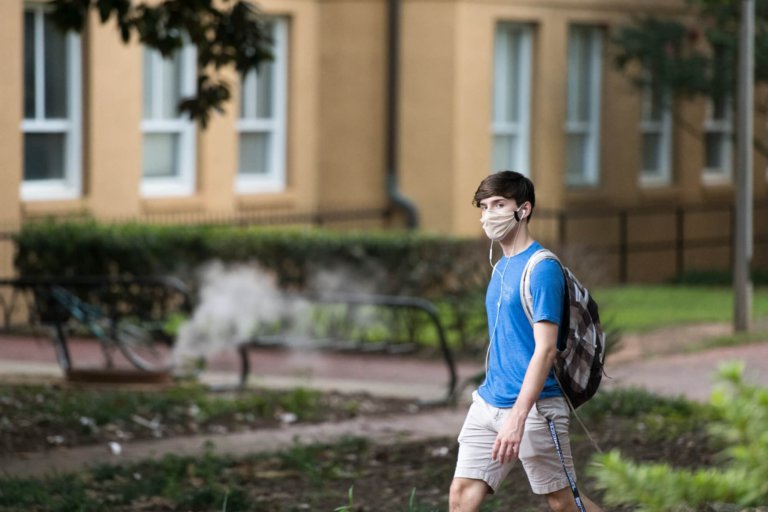
As the world impatiently waits for the pandemic to end, the new Omicron variant has everyone back on high alert. With this, many countries are delaying the entry of foreign travellers and tightening their restrictions — including the US.
For international students (and American citizens) who want to return to the US from abroad, the stricter COVID-19 protocols have already begun, what with winter coming and people spending more time indoors, making the virus more easily spreadable.

The Biden administration at the White House stated that all air travellers wanting to return to the US will have to provide proof of a negative COVID-19 test within 24 hours of boarding their flight. Source: Chip Somodevilla/AFP
This move took place just a few days after the White House announced a ban for foreign nationals to return to the US. The list of countries banned includes South Africa and seven other African countries but doesn’t include US citizens and permanent residents. Below we go through the US Omicron travel updates and what international students should know before travelling to the US:
What are the new COVID-19 testing guidelines to return to the US?
On December 2, the Biden administration at the White House stated that all air travellers wanting to return to the US will have to provide proof of a negative COVID-19 test within 24 hours of boarding their flight. This includes those who are US citizens and the fully vaccinated.
Prior to this, the requirement for the negative test was within 72 hours of a flight. This rule began December 6 and applies to travellers aged two and older.
U.S. CDC urges Americans to avoid travel to France, Jordan over COVID-19 concerns https://t.co/9eAIK5eI4o pic.twitter.com/utl2KLjmTu
— Reuters (@Reuters) December 6, 2021
Do I have to test exactly 24 hours before I fly?
The Centers for Disease Control and Prevention (CDC) notes that travellers have to get tested one day before the flight’s departure. Using a one-day window, test acceptability doesn’t depend on the time of the flight or time of the day when the sample was taken.
For example, if you have a flight at noon on a Friday, you would be allowed to return to the US with a negative test taken at any time on Thursday.
What if I cross the borders by land or seaport?
You are eligible to enter as this new rule only applies to air travel into the US.
For international flights, what COVID-19 tests are acceptable?
According to the CDC, people who want to return to the US must get a negative result for COVID-19 from a viral test — this can be an antigen test or a nucleic acid amplification test (NAAT) — including RT-PCR, RT-LAMP, NEAR, HDA and TMA.
There are also some rapid antigen tests that are admissible if they meet viral test requirements.
What about a home test? Yes, this can also be used if it’s a SARS-CoV-2 viral NAAT or antigen test with emergency use authorisation from the US Food and Drug Administration. It must be done under real-time supervision remotely through an audio and video connection with a telehealth service.
These travel bans will devastate the economies of Southern Africa that are dependent on tourism. They go precisely against what was agreed at the G20 in Italy earlier this year when it was said we must open up travel so the tourism sector can recover.
— Cyril Ramaphosa 🇿🇦 (@CyrilRamaphosa) December 6, 2021
What if I just recently recovered from COVID-19?
If you want to return to the US and you’ve just recently recovered from COVID-19, it’s worth keeping in mind that you can continue to test positive for up to three months after an infection.
According to CDC, you’ll be able to travel with a positive viral test taken within 90 days of a flight but you’ll need more than 14 days to complete a full isolation period of quarantine. You’ll also be required to get a letter from a public health official stating your clearance for travel.
Do I need to be vaccinated to return to the US?
If you’re a non-US citizen, lawful permanent resident or travelling on an immigrant visa, you must be fully vaccinated with an approved shot to return to the US by air. Being fully vaccinated means 14 days after getting the second shot of a two-dose vaccine or two weeks after a one-dose vaccine.
However, US citizens don’t have a vaccination requirement for international flights to return to the US. The CDC highly recommends not travelling internationally for those who aren’t fully vaccinated though.
Do I have to quarantine upon my arrival?
No, not unless you’ve recently recovered from COVID-19. A senior administration official stated in a press briefing that the US wasn’t announcing steps on post-arrival testing and quarantine.
What’s currently being done to detect the new Omicron variant in the US?
CDC is expanding surveillance at four major international airports (Hartsfield-Jackson Atlanta International Airport, John F. Kennedy International Airport, Newark Liberty International Airport and San Francisco International Airport) to keep an eye out for the Omicron variant.
CDC has also ordered directed airlines carrying passengers who have been to certain southern African nations to share their contact information. The contract tracing order has been gathering this information since November 8.










